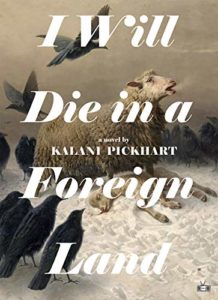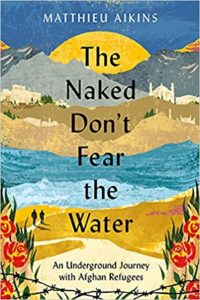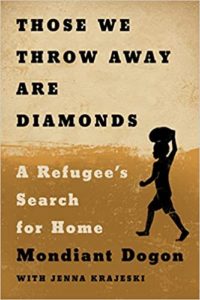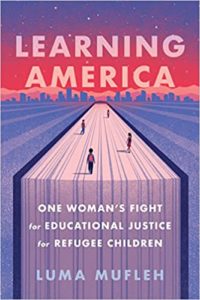I’ve been thinking a lot lately about the meaning of home. I recall a line from the journal of fictional character John-boy Walton, “Home, an island, a refuge, a haven of love.”
Our homes, and by extension, our communities, are supposed to be our refuge. We know and love others in our communities; we have comfort in the customs and language of our people. So, what is it like to be forced to flee our homes, especially by the threat of violence in a time of war — when our neighbors are dying and our familiar is being demolished — and become refugees? Several critically acclaimed new books at A.K. Smiley Public Library address the refugee’s plight.
 I began contemplating this topic while reading I Will Die in a Foreign Land, a debut novel by Kalani Pickhart. An award-winning historical fiction, it is set during the 2013-14 Ukrainian revolution, when then-President Yanukovych chose to forge an alliance with Russian President Putin, and thousands of Ukrainian citizens chose independence by peacefully protesting. Their protests were met with violence by military police, killing over one hundred civilians.
I began contemplating this topic while reading I Will Die in a Foreign Land, a debut novel by Kalani Pickhart. An award-winning historical fiction, it is set during the 2013-14 Ukrainian revolution, when then-President Yanukovych chose to forge an alliance with Russian President Putin, and thousands of Ukrainian citizens chose independence by peacefully protesting. Their protests were met with violence by military police, killing over one hundred civilians.
Pickhart weaves into the novel the fictional stories of protestors whose paths cross, while deftly filling out a tapestry with historical and cultural threads. Though she does not address the plight of the refugee who has fled, she does connect us with characters in upheaval, those who remain in order to fight for the home in which they are no longer comfortable, the democratic home they want to save.
 Two other award-winner titles deal with the harrowing true accounts of recent refugees.
Two other award-winner titles deal with the harrowing true accounts of recent refugees.
The Naked Don’t Fear the Water: An Underground Journey with Afghan Refugees was written by Canadian war reporter Matthieu Aikins. In 2016, Aikins chose to join his friend, Omar, a young Afghan driver, translator, and former interpreter for the American military, in his dangerous journey on the smuggler’s road to Europe, one of millions of refugees who left their homes that year. Omar was raised in exile in Iran and Pakistan, returning to Kabul as a teenager in 2002, only to have the Taliban return to power in 2015. Aikins describes their journey as “mostly waiting punctuated by moments of terror.”
 Those We Throw Away Are Diamonds: A Refugee’s Search for Home is chronicled by refugee Mondiant Dogon, with journalist Jenna Krajeski. Dogon was born in the Democratic Republic of Congo to a Tutsi family. At age three, he and his family fled his home village; the Rwandan genocide against Tutsis had spread into Congo. In the Rwandan refugee camp where they stayed, food was scarce. Later, desperate for a better life, Dogon returned to Congo, only to be imprisoned there, and forced into becoming a child soldier. As an adult, he has earned an MA in international education from New York University, and has become a human rights activist and refugee ambassador. The book’s title comes from one of his poems.
Those We Throw Away Are Diamonds: A Refugee’s Search for Home is chronicled by refugee Mondiant Dogon, with journalist Jenna Krajeski. Dogon was born in the Democratic Republic of Congo to a Tutsi family. At age three, he and his family fled his home village; the Rwandan genocide against Tutsis had spread into Congo. In the Rwandan refugee camp where they stayed, food was scarce. Later, desperate for a better life, Dogon returned to Congo, only to be imprisoned there, and forced into becoming a child soldier. As an adult, he has earned an MA in international education from New York University, and has become a human rights activist and refugee ambassador. The book’s title comes from one of his poems.
 One other new contribution, Learning America: One Woman’s Fight for Educational Justice for Refugee Children, recounts the efforts of a former refugee who wishes to share her good experience in America after arriving from Jordan. She is author Luma Mufleh who designs productive learning environments for refugee children. Mufleh believes in healing their traumas to help foster belonging, ultimately aiding the success of their education, and creating that “haven of love.” She is the founder of Fugees Family, with schools now in Georgia and Ohio and an expanding footprint bringing educational equity to refugee resettlement communities across America.
One other new contribution, Learning America: One Woman’s Fight for Educational Justice for Refugee Children, recounts the efforts of a former refugee who wishes to share her good experience in America after arriving from Jordan. She is author Luma Mufleh who designs productive learning environments for refugee children. Mufleh believes in healing their traumas to help foster belonging, ultimately aiding the success of their education, and creating that “haven of love.” She is the founder of Fugees Family, with schools now in Georgia and Ohio and an expanding footprint bringing educational equity to refugee resettlement communities across America.
For easy access to these titles in the Library’s catalog, find this article on Smiley Blog on our website, www.akspl.org, or directly at www.blog.akspl.org. Using your library card, you may reserve a book through our catalog, at no charge, by clicking on “Place Hold.”
For more reading recommendations on Ukraine, find Toward Understanding the War in Ukraine, a Reading List, published in February on Smiley Blog.